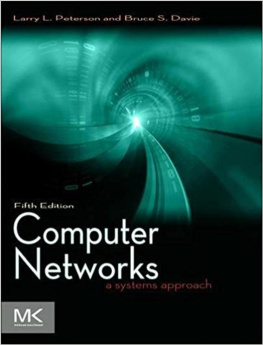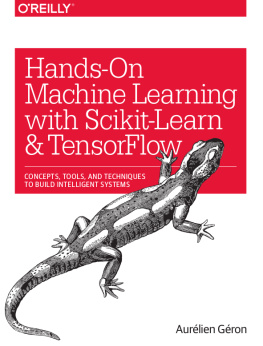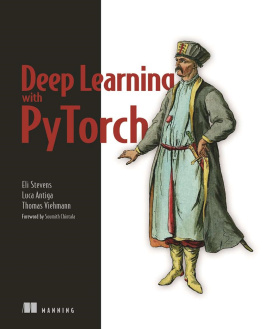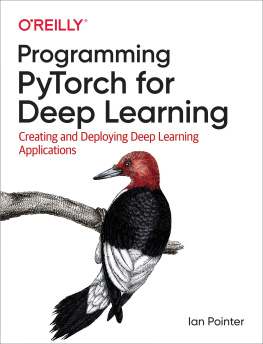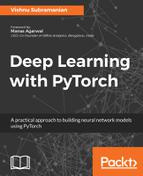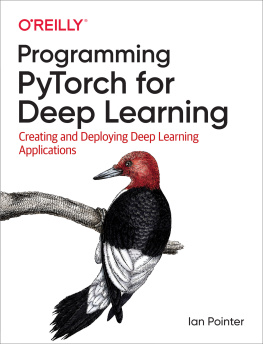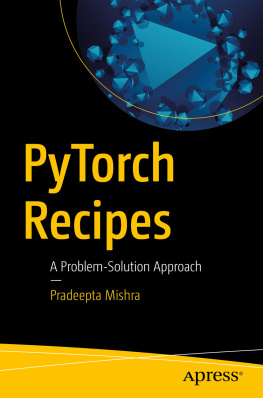it-ebooks - PyTorch Zero To All
Here you can read online it-ebooks - PyTorch Zero To All full text of the book (entire story) in english for free. Download pdf and epub, get meaning, cover and reviews about this ebook. year: 2018, publisher: iBooker it-ebooks, genre: Politics. Description of the work, (preface) as well as reviews are available. Best literature library LitArk.com created for fans of good reading and offers a wide selection of genres:
Romance novel
Science fiction
Adventure
Detective
Science
History
Home and family
Prose
Art
Politics
Computer
Non-fiction
Religion
Business
Children
Humor
Choose a favorite category and find really read worthwhile books. Enjoy immersion in the world of imagination, feel the emotions of the characters or learn something new for yourself, make an fascinating discovery.
PyTorch Zero To All: summary, description and annotation
We offer to read an annotation, description, summary or preface (depends on what the author of the book "PyTorch Zero To All" wrote himself). If you haven't found the necessary information about the book — write in the comments, we will try to find it.
PyTorch Zero To All — read online for free the complete book (whole text) full work
Below is the text of the book, divided by pages. System saving the place of the last page read, allows you to conveniently read the book "PyTorch Zero To All" online for free, without having to search again every time where you left off. Put a bookmark, and you can go to the page where you finished reading at any time.
Font size:
Interval:
Bookmark:
import numpy as np import matplotlib.pyplot as pltx_data = [ 1.0 , 2.0 , 3.0 ]y_data = [ 2.0 , 4.0 , 6.0 ] # our model for the forward pass def forward (x) : return x * w # Loss function def loss (x, y) : y_pred = forward(x) return (y_pred - y) * (y_pred - y)w_list = []mse_list = [] for w in np.arange( 0.0 , 4.1 , 0.1 ): print( "w=" , w) l_sum = for x_val, y_val in zip(x_data, y_data): y_pred_val = forward(x_val) l = loss(x_val, y_val) l_sum += l print( "\t" , x_val, y_val, y_pred_val, l) print( "MSE=" , l_sum / ) w_list.append(w) mse_list.append(l_sum / )plt.plot(w_list, mse_list)plt.ylabel( 'Loss' )plt.xlabel( 'w' )plt.show()x_data = [ 1.0 , 2.0 , 3.0 ]y_data = [ 2.0 , 4.0 , 6.0 ]w = 1.0 # a random guess: random value # our model forward pass def forward (x) : return x * w # Loss function def loss (x, y) : y_pred = forward(x) return (y_pred - y) * (y_pred - y) # compute gradient def gradient (x, y) : # d_loss/d_w return * x * (x * w - y) # Before training print( "predict (before training)" , , forward()) # Training loop for epoch in range(): for x_val, y_val in zip(x_data, y_data): grad = gradient(x_val, y_val) w = w - 0.01 * grad print( "\tgrad: " , x_val, y_val, round(grad, )) l = loss(x_val, y_val) print( "progress:" , epoch, "w=" , round(w, ), "loss=" , round(l, )) # After training print( "predict (after training)" , "4 hours" , forward())import torch from torch.autograd import Variablex_data = [ 1.0 , 2.0 , 3.0 ]y_data = [ 2.0 , 4.0 , 6.0 ]w = Variable(torch.Tensor([ 1.0 ]), requires_grad= True ) # Any random value # our model forward pass def forward (x) : return x * w # Loss function def loss (x, y) : y_pred = forward(x) return (y_pred - y) * (y_pred - y) # Before training print( "predict (before training)" , , forward().data[]) # Training loop for epoch in range(): for x_val, y_val in zip(x_data, y_data): l = loss(x_val, y_val) l.backward() print( "\tgrad: " , x_val, y_val, w.grad.data[]) w.data = w.data - 0.01 * w.grad.data # Manually zero the gradients after updating weights w.grad.data.zero_() print( "progress:" , epoch, l.data[]) # After training print( "predict (after training)" , , forward().data[])import torch from torch.autograd import Variablex_data = Variable(torch.Tensor([[ 1.0 ], [ 2.0 ], [ 3.0 ]]))y_data = Variable(torch.Tensor([[ 2.0 ], [ 4.0 ], [ 6.0 ]])) class Model (torch.nn.Module) : def __init__ (self) : """ In the constructor we instantiate two nn.Linear module """ super(Model, self).__init__() self.linear = torch.nn.Linear(, ) # One in and one out def forward (self, x) : """ In the forward function we accept a Variable of input data and we must return a Variable of output data. We can use Modules defined in the constructor as well as arbitrary operators on Variables. """ y_pred = self.linear(x) return y_pred # our model model = Model() # Construct our loss function and an Optimizer. The call to model.parameters() # in the SGD constructor will contain the learnable parameters of the two # nn.Linear modules which are members of the model. criterion = torch.nn.MSELoss(size_average= False )optimizer = torch.optim.SGD(model.parameters(), lr= 0.01 ) # Training loop for epoch in range(): # Forward pass: Compute predicted y by passing x to the model y_pred = model(x_data) # Compute and print loss loss = criterion(y_pred, y_data) print(epoch, loss.data[]) # Zero gradients, perform a backward pass, and update the weights. optimizer.zero_grad() loss.backward() optimizer.step() # After training hour_var = Variable(torch.Tensor([[ 4.0 ]]))y_pred = model(hour_var)print( "predict (after training)" , , model(hour_var).data[][])import torch from torch.autograd import Variable import torch.nn.functional as Fx_data = Variable(torch.Tensor([[ 1.0 ], [ 2.0 ], [ 3.0 ], [ 4.0 ]]))y_data = Variable(torch.Tensor([[], [], [], []])) class Model (torch.nn.Module) : def __init__ (self) : """ In the constructor we instantiate nn.Linear module """ super(Model, self).__init__() self.linear = torch.nn.Linear(, ) # One in and one out def forward (self, x) : """ In the forward function we accept a Variable of input data and we must return a Variable of output data. """ y_pred = F.sigmoid(self.linear(x)) return y_pred # our model model = Model() # Construct our loss function and an Optimizer. The call to model.parameters() # in the SGD constructor will contain the learnable parameters of the two # nn.Linear modules which are members of the model. criterion = torch.nn.BCELoss(size_average= True )optimizer = torch.optim.SGD(model.parameters(), lr= 0.01 ) # Training loop for epoch in range( 1000 ): # Forward pass: Compute predicted y by passing x to the model y_pred = model(x_data) # Compute and print loss loss = criterion(y_pred, y_data) print(epoch, loss.data[]) # Zero gradients, perform a backward pass, and update the weights. optimizer.zero_grad() loss.backward() optimizer.step() # After training hour_var = Variable(torch.Tensor([[ 1.0 ]]))print( "predict 1 hour " , 1.0 , model(hour_var).data[][] > 0.5 )hour_var = Variable(torch.Tensor([[ 7.0 ]]))print( "predict 7 hours" , 7.0 , model(hour_var).data[][] > 0.5 )import torch from torch.autograd import Variable import numpy as npxy = np.loadtxt( './data/diabetes.csv.gz' , delimiter= ',' , dtype=np.float32)x_data = Variable(torch.from_numpy(xy[:, : -1 ]))y_data = Variable(torch.from_numpy(xy[:, [ -1 ]]))print(x_data.data.shape)print(y_data.data.shape) class Model (torch.nn.Module) : def __init__ (self) : """ In the constructor we instantiate two nn.Linear module """ super(Model, self).__init__() self.l1 = torch.nn.Linear(, ) self.l2 = torch.nn.Linear(, ) self.l3 = torch.nn.Linear(, ) self.sigmoid = torch.nn.Sigmoid() def forward (self, x) : """ In the forward function we accept a Variable of input data and we must return a Variable of output data. We can use Modules defined in the constructor as well as arbitrary operators on Variables. """ out1 = self.sigmoid(self.l1(x)) out2 = self.sigmoid(self.l2(out1)) y_pred = self.sigmoid(self.l3(out2)) return y_pred # our model model = Model() # Construct our loss function and an Optimizer. The call to model.parameters() # in the SGD constructor will contain the learnable parameters of the two # nn.Linear modules which are members of the model. criterion = torch.nn.BCELoss(size_average= True )optimizer = torch.optim.SGD(model.parameters(), lr= 0.1 ) # Training loop for epoch in range(): # Forward pass: Compute predicted y by passing x to the model y_pred = model(x_data) # Compute and print loss loss = criterion(y_pred, y_data) print(epoch, loss.data[]) # Zero gradients, perform a backward pass, and update the weights. optimizer.zero_grad() loss.backward() optimizer.step()# References # https://github.com/yunjey/pytorch-tutorial/blob/master/tutorials/01-basics/pytorch_basics/main.py # http://pytorch.org/tutorials/beginner/data_loading_tutorial.html#dataset-class import torch import numpy as np from torch.autograd import Variable from torch.utils.data import Dataset, DataLoader class DiabetesDataset (Dataset) : """ Diabetes dataset.""" # Initialize your data, download, etc. def __init__ (self) : xy = np.loadtxt( './data/diabetes.csv.gz' , delimiter= ',' , dtype=np.float32) self.len = xy.shape[] self.x_data = torch.from_numpy(xy[:, : -1 ]) self.y_data = torch.from_numpy(xy[:, [ -1 ]]) def __getitem__ (self, index) : return self.x_data[index], self.y_data[index] def __len__ (self) : return self.lendataset = DiabetesDataset()train_loader = DataLoader(dataset=dataset, batch_size=, shuffle= True , num_workers=) for epoch in range(): for i, data in enumerate(train_loader, ): # get the inputs inputs, labels = data # wrap them in Variable inputs, labels = Variable(inputs), Variable(labels) # Run your training process print(epoch, i, "inputs" , inputs.data, "labels" , labels.data)Font size:
Interval:
Bookmark:
Similar books «PyTorch Zero To All»
Look at similar books to PyTorch Zero To All. We have selected literature similar in name and meaning in the hope of providing readers with more options to find new, interesting, not yet read works.
Discussion, reviews of the book PyTorch Zero To All and just readers' own opinions. Leave your comments, write what you think about the work, its meaning or the main characters. Specify what exactly you liked and what you didn't like, and why you think so.



